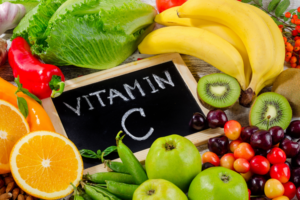
How Vitamin C Boosts Muscle Growth, Recovery, and Performance
September 13, 2024
The Importance of Vitamin C for Muscle Growth
Everyone knows when it comes to building muscle, you need protein, but many forget that vitamins are also a huge part of this mix. They are important molecules for growth and recovery. Vitamins are required for thousands of processes by which our body repairs muscles and performs tasks, including those that keep us alive. Of these, Vitamin C is especially notable for its unique advantages.
A great antioxidant that has been shown to help with overall well-being, Vitamin C’s effect on muscle growth is frequently overlooked. Not only is Vitamin C anti-inflammatory, which reduces inflammation, but it also helps the body recover and produce key proteins like collagen. This makes Vitamin C an indispensable part of any fitness regime. Read on to discover how Vitamin C helps you achieve tougher muscles, faster recovery, and stronger performance, and why all athletes should be following a diet that includes it.
The Science of Vitamin C

Vitamin C as an Antioxidant
One of the biggest reasons why Vitamin C is important for building muscle is its role as a potent antioxidant. When you work out intensively, the body creates substances called free radicals, which can result in oxidative stress and subsequent muscle damage. Antioxidants in vitamins, like malondialdehyde, neutralize free radicals that cause cell damage and inflammation. This not only prevents muscle breakdown but also helps you recover faster after workouts.
Decreasing Post-Exercise Oxidative Stress and Muscle Damage
Vitamin C is crucial in dealing with oxidative stress, which typically appears after intense muscle exertion. Muscles pushed to their limits tear, creating soreness and potential injury. Vitamin C reduces oxidative stress, meaning muscle damage is less severe, and you recover quicker. For those seeking consistent muscle growth, reducing recovery time between workouts is essential, and Vitamin C plays a major role in this process.
Vitamin C and Collagen Synthesis for Muscle Repair
Another important role of Vitamin C in muscle growth is its involvement in collagen synthesis. Collagen forms the connective tissue in muscles, tendons, and ligaments—essential for muscle recovery and growth. When you work out, muscle tissue breaks down and needs collagen to rebuild and strengthen.
Vitamin C aids in the repair of muscle damage due to its effect on collagen synthesis. Without sufficient Vitamin C, collagen production can be impaired, which may slow muscle repair and growth. With its antioxidant properties and role in collagen formation, Vitamin C is vital for muscle recovery, tissue repair, and post-exercise regeneration.
Protein Metabolism and Muscle Synthesis
Vitamin C serves a major role in protein metabolism, which directly affects muscle synthesis. Protein metabolism involves the breakdown of proteins into amino acids, the building blocks your muscles need to grow and repair themselves. Vitamin C supports this process, increasing the utilization of dietary proteins by the body—crucial for anyone looking to gain muscle mass. Without sufficient Vitamin C, this process can become less efficient, slowing down optimal muscle development.
Boosting Immunity for Sustainable Workouts
Consistency in workouts is one of the most important factors for attaining muscle growth. Vitamin C boosts the immune system, helping to fight off illness and keeping you training regularly. A strong immune system also means faster recovery from intense workouts, reducing downtime from sickness or injury. This often-overlooked aspect of Vitamin C is vital for any athlete or fitness enthusiast who needs to stick to their workout schedule without interruptions from illness.
Effects on Anabolic Hormones
Vitamin C contributes to the production of anabolic hormones—particularly testosterone—which are essential for muscle development. Testosterone helps build muscle proteins, and while Vitamin C doesn’t directly increase hormone production, it does lower stress hormones like cortisol. By reducing cortisol levels, Vitamin C enables anabolic hormones like testosterone to function more efficiently, aiding muscle growth and repair after workouts.
Vitamin C Benefits for Athletes and Fitness Enthusiasts

Faster Muscle Recovery Post-Workout
One huge advantage of Vitamin C for muscle growth is its capacity to accelerate muscle recovery. During a workout, muscles experience tiny tears that need time to heal. Vitamin C reduces inflammation and oxidative stress, which helps tissues heal faster. Athletes who incorporate Vitamin C into their diet or supplementation often recover quicker and can return to training sooner, which is crucial for continuous muscle growth.
Improved Endurance and Performance
Vitamin C not only assists in muscle repair and faster recovery but also increases endurance and overall performance during strenuous exercise. As an antioxidant, it protects muscles from fatigue and damage during prolonged periods of effort. With adequate Vitamin C intake, athletes can push through challenging workouts and maintain high performance. This improved stamina allows for more intense training sessions, contributing to long-term muscle growth.
Better Joint Health and Collagen Production
For those lifting heavy weights or engaging in endurance activities, joint health is a key concern. Vitamin C is essential for collagen synthesis, which forms the connective tissues in tendons and ligaments. Stronger joints help prevent injury and enable the body to handle the physical demands of weightlifting, running, and other high-impact exercises. By supporting collagen production, Vitamin C helps maintain robust joints and aids in muscle growth, ensuring the body remains strong and resilient.
Vitamin C for Muscle Growth—How Much Do You Need?
Daily Amount Needed by Active vs Non-Active Individuals
The amount of Vitamin C you need can depend greatly on your activity level. For the general population, the recommended daily intake is about 75 mg for women and 90 mg for men. However, if you’re an active individual—especially an athlete or fitness enthusiast—you could probably use a bit more. That’s because exercise causes extra oxidative stress, and Vitamin C helps fight this by reducing inflammation and speeding up muscle recovery. For athletes, daily intake might range from 200–500 mg to promote muscle growth and repair, ensuring faster recovery after intense workouts.
Is There Such a Thing as Too Much Vitamin C?
While Vitamin C is water-soluble and excess amounts are usually eliminated through urine, there is still a limit to how much is useful. Taking more than 2,000 mg per day can lead to side effects like nausea, diarrhea, and abdominal cramps. High doses, although not typically harmful, don’t necessarily lead to more muscle growth or better recovery. It’s best to stay within the normal recommended range and avoid excessive supplementation unless advised by a healthcare provider.
When is the Appropriate Time to Take Vitamin C Supplements?

Dietary Sources vs. Supplements
Your body thrives on getting Vitamin C for muscle growth from natural dietary sources like citrus fruits and vegetables, but supplements can help too. For those who can’t get enough Vitamin C-rich foods in their diets—especially when life gets busy or for those with dietary restrictions—supplements offer an easy and effective way to meet your daily needs. However, whole foods provide other important nutrients, like fiber and antioxidants, that supplements can’t fully match. Supplements are useful, especially for athletes, but they should complement a balanced diet rich in Vitamin C sources, not replace it.
Here are some Vitamin C-rich foods:
- Oranges and other citrus fruits (lemons, limes, grapefruits)
- Strawberries
- Kiwi
- Bell peppers (especially red and yellow)
- Broccoli
- Brussels sprouts
- Kale
- Papaya
- Pineapple
- Tomatoes
- Spinach
Benefits for Athletes
Athletes, in particular, may benefit from taking Vitamin C supplements due to the increased oxidative stress and muscle strain they experience during intense workouts. Vitamin C supplements offer a convenient, more bioavailable way to support faster recovery and prevent injury. They also ensure consistent intake, especially when daily needs can’t be met through diet alone. By incorporating supplements, athletes can better maintain optimal Vitamin C levels, enhancing collagen formation, reducing muscle damage, and improving overall recovery.
Mobile IV Vitamin C for Muscle Recovery
When it comes to receiving the benefits of Vitamin C quickly and where you need them most, mobile IV therapy is a game-changer for muscle recovery. Uplift IV Wellness offers the Uplifted Myers’ Cocktail, an all-inclusive therapy used for hydration, energy activation, and muscle repair.
This treatment is a modified version of the Myers’ Cocktail, containing Vitamin C, magnesium, B-complex vitamins, and B12. By directly administering Vitamin C into the bloodstream through mobile IV therapy, it is absorbed faster and becomes available immediately, unlike absorption through the digestive system. This treatment is especially beneficial for athletes who need rapid recovery after intense physical exertion or are looking for an extra boost in muscle repair. Vitamin C, being a powerful antioxidant, combats oxidative stress, supports collagen production, and ensures faster muscle recovery.
From reducing oxidative stress to promoting collagen production, Vitamin C is vital for muscle repair and growth. Ensuring you get enough Vitamin C, whether through diet, supplements, or advanced therapies like mobile IV treatment, can significantly enhance your recovery and performance. For a faster and more effective way to boost your muscle recovery, book an appointment with Uplift IV Wellness today and experience the Uplifted Myers’ Cocktail—designed to deliver Vitamin C and other essential nutrients directly to your body!